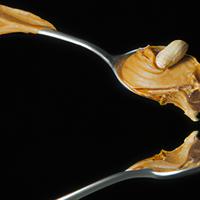
1 serving (5 grams) contains 30 calories, 1.2 grams of protein, 2.5 grams of fat, and 1.0 grams of carbohydrates.

Log this food in SnapCalorie

Nutrition Information
Calories |
1428.6 | ||
|---|---|---|---|
% Daily Value* |
|||
| Total Fat | 119.0 g | 152% | |
| Saturated Fat | 23.8 g | 119% | |
| Polyunsaturated Fat | 0 g | ||
| Cholesterol | 0 mg | 0% | |
| Sodium | 952.4 mg | 41% | |
| Total Carbohydrates | 47.6 g | 17% | |
| Dietary Fiber | 9.5 g | 33% | |
| Sugars | 23.8 g | ||
| protein | 57.1 g | 114% | |
| Vitamin D | 0 mcg | 0% | |
| Calcium | 238.1 mg | 18% | |
| Iron | 4.8 mg | 26% | |
| Potassium | 1428.6 mg | 30% | |
* Percent Daily Values are based on a 2,000 calorie diet. Your daily values may be higher or lower depending on your calorie needs.
Food Attributes
Source of Calories
About Teaspoon of peanut butter
A teaspoon of peanut butter is a small, nutrient-dense portion of this popular spread, typically made from ground roasted peanuts. Peanut butter has its origins in the United States and is a staple in American cuisine, though its use has spread worldwide. Packed with protein, healthy monounsaturated fats, and essential nutrients like vitamin E, magnesium, and phosphorus, it provides quick energy and satiates hunger. Its natural oils and protein content make it a good choice for muscle recovery and sustained energy. However, moderation is key, as this spread is also calorie-dense and can contain added sugars and sodium, depending on the brand. For the healthiest option, look for peanut butter made with minimal ingredients—just peanuts and a touch of salt. Whether added to smoothies, spread on whole-grain bread, or eaten straight off the spoon, peanut butter is a versatile and satisfying snack.



